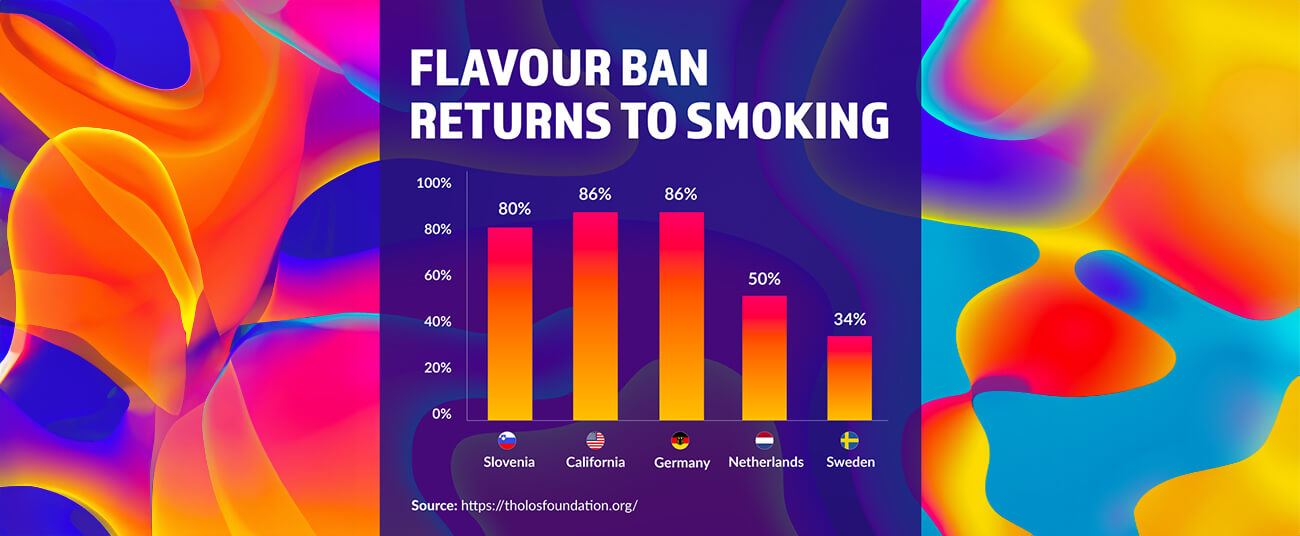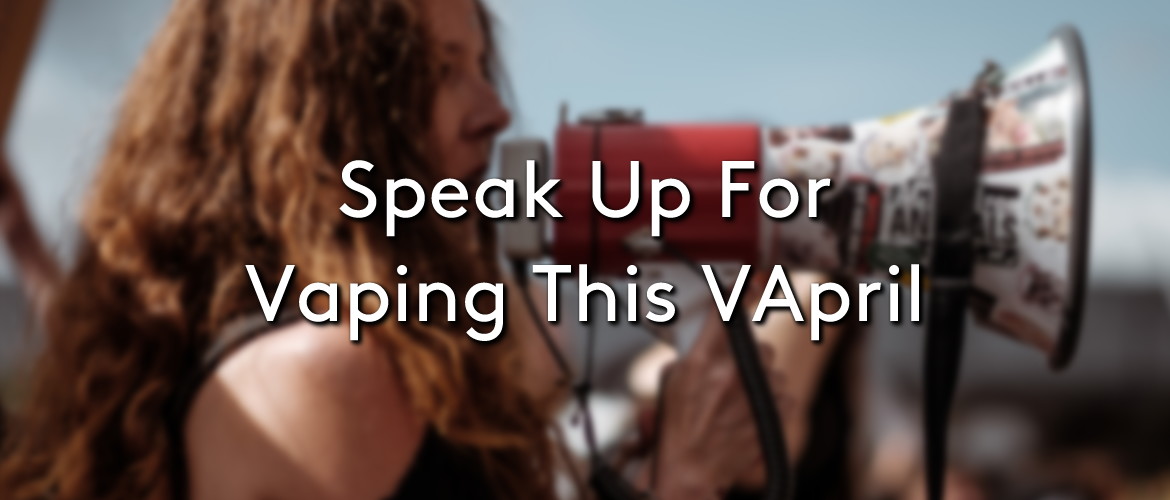- Are vape flavours being banned?
- What is the Tobacco and Vapes Bill?
- What happened to the Tobacco and Vapes Bill after the general election?
- Labour's reintroduced Tobacco and Vapes Bill
- The APPG for Responsible Vaping launch inquiry into the role of vaping
- Were the proposed vaping regulations a step too far?
- Have vape flavour bans been effective in other countries?
- Australia introduces flavour ban alongside law reforms
- How is vaping different to smoking?
- Government responds to petition against vape flavour bans
- Which vape flavours might be banned?
- Government assessment finds flavour bans could put over 1 in 10 ex-smokers at risk of relapse
- Flavour bans could stop smokers from quitting
- Tougher sanctions around selling vapes to underage users needed
- Flavour bans could lead to a boom in the illicit market
- Timeline: government communication around vaping bans
- When will vape flavours be banned?
- What does it mean for the UKs vapers?
- Evapo reaction to the proposed flavour ban
Are vape flavours being banned?
As part of the UK Government’s attempts to create a smokefree generation and tackle youth vaping, the Conservative Government drafted new regulations for vaping products which included restricting certain vape flavours which are seen to be particularly appealing to younger vapers.
However, the recent general election means that the Tobacco and Vapes Bill will be restarting its progress through Parliament, giving the opportunity for the finer points of what these new powers to restrict vaping products to be subject to the scrutiny and consultation needed to ensure a balanced approach that both considers the need to tackle youth vaping and the need to offer adult smokers an effective alternative to smoking.
What is the Tobacco and Vapes Bill?
The Tobacco and Vapes Bill was introduced to Parliament on 20 March 2024, and included the introduction of a generational tobacco ban along with seeking new powers to restrict vape flavours, packaging, and how and where vapes are displayed in shops. The bill also aimed to bolster enforcement agencies by allowing for on the spot fines of £100 to retailers who are caught selling tobacco and vaping products to minors.
The aim of this bill was to protect young people from the harms of tobacco, and to tackle the rise in youth vaping, following a call for evidence and consultation held last year.
The bill was the first step in the formal process before any new regulations and restrictions on vaping could come into force, a process which includes consultations, debates and opportunities for the bill to be considered and amendments made, to find the best balance between protecting children and aiding adult smokers.
The Tobacco and Vapes Bill had its second reading in the House of Commons on 16 April 2024, which offered the first opportunity for MPs to debate the main principles of the Bill. Following the debate there was a vote to decide if the Bill would continue to the committee stage, which passed by 383 to 67, although 106 Tory MPs chose not to cast their vote.
The committee stage commenced in late April 2024, and was the stage at which proposed amendments to the content could be tabled. However, just as the bill was entering the report stage, which would have allowed MPs to consider further amendments, a general election was announced on 22 May 2024. Following this there was a two day ‘wash-up’ window for parliament to address any unfinished business before dissolution. This allows for outstanding bills to be rushed through the parliamentary process, and the Government will usually choose to focus on Bills that have a high likelihood of passing through the legislative procedure, sacrificing the rest.
The Tobacco and Vapes Bill was not included during the ‘wash-up’ period, and Parliament was prorogued on 24 May, with dissolution taking place on 30 May. This means that the bill was excluded from the Commons Schedule and all progress the bill has made thus far will be abandoned.
While there are certainly parts of the Tobacco and Vapes Bill which we welcomed, such as the increased power to enforcement officers and the introduction of on-the-spot fines for those retailers caught selling to minors, other aspects like the possible restriction of vape flavours felt like an overreach which could negatively impact adult smokers and vapers. The fact that the Conservative Government's progress with the Bill is being abandoned is a welcomed announcement, as many felt that the generational smoking ban caused the many oversteps of the proposed vaping regulations to be overshadowed and not given the appropriate scrutiny.
The Tobacco and Vapes Bill felt to many as though it was being rushed through the parliamentary process which left little room for the appropriate consideration or impact assessments. The committee tasked with guiding the bill through parliament did not have balanced membership, and there was a distinct lack of representation seen from the vaping industry, resulting in many incorrect health effects of vaping being presented to the committee as fact.
The new Labour Government revealed in The King's Speech on 17th July that they do intend to reintroduce the Tobacco and Vapes Bill, which was then presented to Parliament on 5th November. The Bill had its second reading in the House of Commons on 26 November which it passed with a vote of 415 to 47 in favour, a 368 majority. On 7th January 2025 the Bill moved on to the next stage of the process, a Public Bill Committee which will scrutinise the Bill line by line.
On 30th January 2025 the committee stage of the Tobacco and Vapes Bill concluded, with the Bill moving back to the House of Commons for the report stage. As of 27th of March the bill has completed its progress with the House of Commons and has moved on to the House of Lords where it is currently undergoing the committee stage, having completed its second reading on 23rd April. Going forward the timeline for the progression of the Bill will depend on the legislative timetable, and so remains unclear, with Royal Assent expected to be achieved in Autumn.
What happened to the Tobacco and Vapes Bill after the general election?
As the bill was not passed during the ‘wash-up’ window and Parliament has now been dissolved, the Tobacco and Vapes Bill was effectively abandoned. The King's Speech revealed that the new Labour Government do plan to reintroduced the bill in the next parliamentary session, but it would require the bill to start completely from scratch and means we may see some changes.
Rishi Sunak stated in an interview with the BBC that he was “disappointed” that the bill was not passed, as he "stepped up to do something that is bold" with the proposed introduction of a generational smoking ban. However, the smoking ban was supported by all major parties and Labour had expressed their support, and suggested this is something they intended to pursue if the election went in their favour. In fact, Action on Smoking and Health (ASH) released new analysis from YouGov which found that every parliamentary constituency in Great Britain backs the generational tobacco ban, and even two thirds of 11-15 year olds, the first generation who would be affected by the ban, also back it.
It is important to note though that this support was only expressed for the smoking ban, and not the Tobacco and Vapes Bill itself. In general, there has been very little mention of the vaping side of the bill thus far, and it is unclear what kind of new vaping regulations will be sought in the new parliamentary session. However, one thing that is clear is that these regulations will not be brought in on the schedule previously proposed by the Tory Government, and so certain vape flavours will not be banned on 1 April 2025 as previously suggested.
The Labour manifesto speaks of banning branding and advertising which is appealing to children, and plans to pursue the generational smoking ban, giving us an indication of what we may expect from the reintroduced bill.
The generational smoking ban is an important piece of legislation which could have truly positive health implications for future generations, but it has completely overshadowed the vaping regulations also included in the bill, and could have seen detrimental restrictions imposed hidden behind the smoking ban. The bill being abandoned allows for the opportunity for smoking and vaping to be considered as two separate entities, something which should arguably have been the case from the start.
Labour's reintroduced Tobacco and Vapes Bill
On 5th November 2024 the Labour Government introduced their reworked Tobacco and Vapes Bill in Parliament, to restart the process of introducing new regulations. This process takes time and involves numerous rounds of debates, investigation, and voting, so for now it is difficult to say how long it will take for the Bill to pass, but we do know that it is likely that it will pass.
Labour's version of the Tobacco and Vapes Bill tackles all of the same issues as the original bill, but does go into more detail in certain areas, such as including vaping in the indoor smoking ban and extending it to some outdoor areas such as playgrounds and outside schools. However, it is important to remember that this bill is only to gain the powers to regulate, and each individual aspect will be subject to consultation, debate, and change.
In response to a petition against flavour bans the government make it clear that they would undertake further consultation before any restrictions were put in place, to ensure restrictions are effective without removing crucial products for adult smokers. They explain:
"To avoid unintended consequences on smoking rates, any restrictions will be carefully considered... In considering the specific restrictions we bring forward, we are keenly aware that vaping is rightly used by adults as a tool to quit smoking. Vapes are less harmful than cigarettes, and vape flavours are an important consideration for adult smokers seeking to quit smoking.
"We are conscious of the need to avoid unintended consequences on adult smoking rates, and therefore the scope and impact of any restrictions will be carefully considered and weighed against evidence. That is why we will be consulting further on these measures as soon as possible after Royal Assent of the Tobacco and Vapes Bill, and we would invite people to submit their views and evidence for consideration as part of that process."
This new bill also specifies that they seek powers to regulate on nicotine products, so as to cover newer products like nicotine pouches and strips, and to cover any future nicotine products that may come into production.
One of the good things about the new Bill is that the Labour Government are seeking to introduce a licensing scheme for retailers selling tobacco, vape, and nicotine products, something which we have been lobbying for. This could be very beneficial both at tackling illicit sellers, protecting businesses who abide by the law, and raising funds for enforcement.
The APPG for Responsible Vaping launch inquiry into the role of vaping
The All Party Parliamentary Group (APPG) for Responsible Vaping launched their inquiry into the role of vaping in the UK on 9th October 2024, to gather insights and evidence on the impact that vaping has on a variety of topics including public health, the environment, and the economy. A big focus of the inquiry will be on addressing the government's proposed legislative measures, including possible flavour restrictions, a disposable vape ban, and the introduction of a new vape product duty.
The two month inquiry hopes to collate insights and experience from experts in sectors like respiratory health, tobacco dependence, and smoking cessation, to form a report highlighting best practices for supporting adults in quitting smoking while addressing concerns like youth vaping, the illicit vaping market, and the impact on the environment. The report will include analysis as well as practical and legislative suggestions around the role of vaping.
The APPG work within parliament to provide a voice on vaping issues, and hope to ensure that any new legislations that may be brought in around vaping products in the coming years take a balanced approach, putting equal focus on the need to protect minors and the environment, and the benefits that vaping offers as a smoking cessation tool for adults.
Mary Glindon MP, Chair for the APPG for Responsible Vaping, said:
“Bringing together experts from a range of respective fields, to address the key issues associated with vaping, is crucial and we urge the Government to work closely with the APPG over the coming months to ensure that the regime we end up with is fair and balanced, without risking the many benefits that vaping can bring.
“I look forward to seeing the inquiry findings, particularly in encouraging industry-led improvement and putting forward practical and legislative suggestions ahead of the upcoming Tobacco and Vapes Bill.”
Were the proposed vaping regulations a step too far?
While there were aspects of the Tobacco and Vapes Bill which we would have been pleased to see introduced, such as the additional powers to enforcement agencies, others, like flavour restrictions, raise concerns about the affects this could have on smoking rates. We were disappointed to see the extent to which the Tory Government were seeking to regulate vaping products in the Bill, which included powers to not only regulate on packaging, flavours and displays, but also to regulate the size and shape of vaping products, any markings like branding and trademarks, as well as other features that help to distinguish between different brands.
These proposed regulations went far beyond what is needed to ensure vapes are not disproportionately appealing to minors, and further than the public was lead to believe. Should these regulations have come to pass it would have given the Government the power to dictate so many aspects of the size, design, and appearance of vape products that they could effectively make them indistinguishable between brands, a step that feels wholly unnecessary. Not only that but they could have potentially had a devastating impact on the health of both smokers and vapers, which is something that we surely want to avoid.
In fact, it was revealed that the Department of Health and Social Care did not actually carry out any risk assessments into the health impact that these regulations could have had should they have caused fewer people to use e-cigarettes as a stop smoking aid.
Marcus Saxton, Chairman of the Independent British Vape Trade Association, commented:
“Excessive restrictions on the types of products that our members can provide may reduce the products’ appeal, but even worse, may contribute to continued misperceptions about the harm of vaping relative to tobacco smoking. Specifically, the role of flavours in supporting adult smokers to a successful quit attempt is extensive and widespread, and therefore any reference to potential powers to permit future legislation around their use is extremely worrying, and threatening to the Government’s own goals of becoming smoke free by 2030”
UKVIA Director General John Dunne expressed the need for more consideration should these sorts of regulations be considered in future, explaining:
"It is wrong to rush any legislation through parliament without proper scrutiny but with a Bill like this, where lives are quite literally at stake, it is even more important that the correct checks and balances are in place when considering what new powers to introduce.
"We believe that properly drafted new measures to ban child-friendly designs and flavour names and ensure that products, backed up by a powerful and effective enforcement regime will continue to see smoking rates fall while ensuring that youth uptake rapidly comes down.”
Andrej Kuttruf, CEO and Founder of Evapo, explains:
“While the delay in legislation provides a temporary reprieve, it underscores the need for a balanced approach to public health policy. Our customer survey shows that 88% of vapers are former smokers, and 93% have either quit or reduced smoking thanks to vaping. Flavour bans and excessive taxation could reverse this progress, pushing vapers back to smoking and fuelling the illicit market.
“The data clearly shows the essential role that diverse vape flavours play in helping adults quit smoking. As policymakers revisit the Tobacco & Vapes Bill, we urge them to consider these insights and prioritise enforcement of existing laws over new restrictions.
”Our commitment to a smoke-free future remains steadfast, and we stand ready to collaborate on solutions that protect youth without compromising adult smokers’ access to safer alternatives.”
The evidence from other countries where similar restrictions have been introduced shows that they can backfire, fuelling the flames of the illicit market by flooding it with non-compliant and possibly dangerous products. These products are not only potentially harmful, but the irresponsible retailers willing to sell illicit products are the same ones who are not likely to adhere to age verification. One example of this is in California, where 85% of vapers reported it was easy to find banned flavours, and almost 90% still use banned flavours finding them easily accessible online and in local stores.
These proposed vaping restrictions, in combination with the June 2025 implementation of the ban on the sale of disposable vapes. Together with the recently announced Vaping Products Duty which will increase the price of vape liquids by up to £3 per 10ml, come together to create too much restriction on a product that has the potential to make a real impact on declining smoking rates.
The concern is that if the Government cannot enforce the regulations currently in place effectively, which already restrict the sale of vaping products to those over the age of 18, how would they enforce these additional, more complex ones.
Have vape flavour bans been effective in other countries?
The short answer to this is no, there are a plethora of examples of vape flavours being restricted in other countries, and they have overwhelmingly proven to be detrimental.
The World Vapers' Alliance recently revealed that the 2024 Eurobarometer shows, following flavour bans in Estonia, smoking rates have increased by almost 40%, suggesting that they have driven many vapers back to smoking. Not only that, but it would seem that the bans themselves were pretty unsuccessful as analysis from the Tholos Foundation found that 60% of vapers kept using flavours by mixing them themselves or purchasing from the illicit market.
Another example comes from America, where flavour restrictions in San Francisco resulted in teenage smoking rates rising for the first time in decades, and bans in Massachusetts resulting in a rise in the sale of cigarettes.
The importance of vape flavours is so frequently misunderstood, due to the misconception that they are targeting young people as opposed to making vaping more appealing to adults. The Yale School of Public Health found that using non-tobacco flavoured vapes was associated with a 230% increase in adult smoking cessation.
While vaping is an alternative to smoking, having non-tobacco flavours allows users to forget the taste of tobacco, and is something that is utilised in other nicotine replacement options like gum and inhalers. In a submission to an Australian House of Representatives’ Committee, Mendolsohn made an important observation;
“Flavours are an important part of the appeal of vaping for adult smokers and make the products attractive as an alternative to smoking, just as flavours are also used to enhance the appeal of nicotine gum. Banning flavours would likely undermine the use of e-cigarettes and public health.”
In fact, other countries where flavour bans are being considered are already seeing evidence of the negative effects they could have. In Germany, 83% of vapers say that flavours are an important part of their decision to vape, and only 8% would support a flavour ban. Estimates suggest that flavour bans in Germany could result in more than half of German vapers returning to smoking or resorting to the illicit market and mixing their own e-liquids.
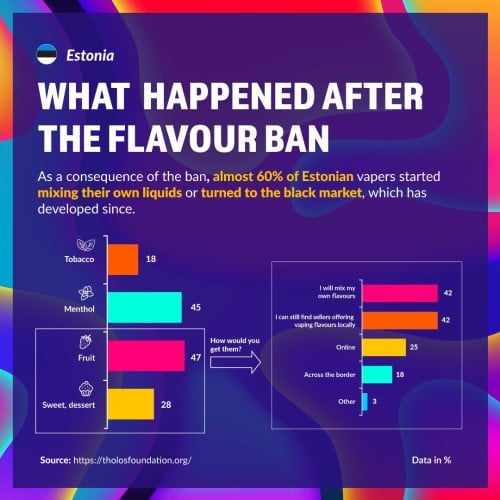
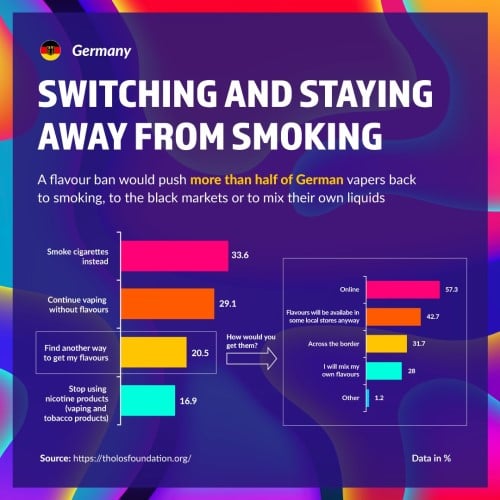
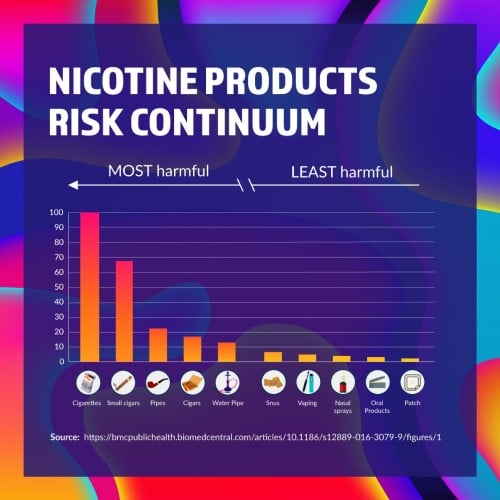
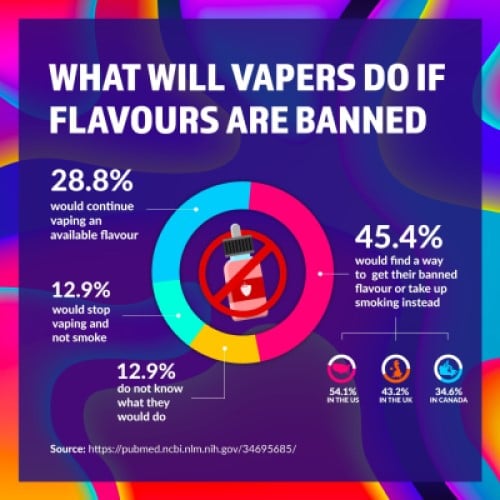
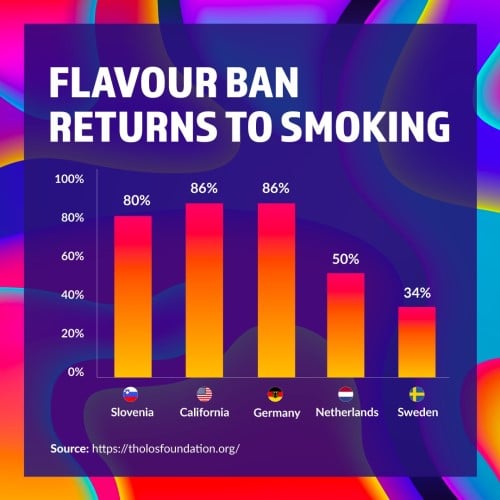
A recent study from the BMJ looking into how effective smoking bans are also offers some insight into how effective blanket bans can be. Although this study was mainly focused on smoking bans, like the generational smoking ban proposed in the Tobacco and Vapes Bill, it does reveal that scientific evidence on whether these kinds of bans work is still mixed.
For example, when the UK introduced a ban on smoking in enclosed public spaces in 2006, this did lead to a drop in smoking prevalence, but less comprehensive smoking bans in some countries actually saw a small increase in smoking rates.
The study also points out that the introduction and rise in popularity of e-cigarettes has had a clear affect on the reduction of smoking prevalence in countries where they are well regulated and embraced as a smoking cessation tool. Smoking rates in the UK have almost halved from 25% in 2004 to 12.9%, and Canada have seen a reduction from 17.7% in 2015 to 10.2% in 2021. This is considered to as a result of smokers switching to vaping as a less harmful alternative.
This suggests that our current regulations for e-cigarettes have been successful at tackling smoking rates in the UK, however, concerns are that over-regulation such as a flavour ban could have the reverse affect, pushing vapers back to smoking.
Australia introduces flavour ban alongside law reforms
Despite flavour bans having been ineffective in many countries, Australia has now introduced flavour restrictions as part of their reformed laws around vaping. Previously, vape products were only available to smokers in Australia on prescription, which led to a boom in the illicit vaping market which went widely unchecked. However, in a bid to ensure that adult smokers and vapers have access to e-cigarettes while minors do not, they have now made vaping products available without a prescription, but only from pharmacies.
Vape products will be sold behind the counter at pharmacies, with plain packaging and flavours limited to only mint, menthol, or tobacco. This means that anyone wanting to purchase them will have to speak to a pharmacist in order to do so, and that flavours and designs seen as appealing to children are no longer available. This also ensures that age verification must be completed before purchase.
Another crucial part of these new laws is that they take a 'more assertive approach' to cracking down on the illicit vape market. It has previously been shockingly easy for retailers like convenience stores to sell illegal vape products with little to no repercussions. However, these new laws could see retailers caught illegally supplying or manufacturing vape products hit with penalties of up to seven years in prison and fines of $2 million.
Australia are quite a unique example, because although they have limited the flavours available, in removing the need for a prescription they are also making vapes more accessible to adults, so it is yet to be seen if this flavour ban will be an effective solution.
How is vaping different to smoking?
By including tobacco and vapes in the same bill the Tory government were inadvertently perpetuating the misconception that they are two sides of the same coin. Rather, smoking is the leading cause of preventable death in the UK, while vaping is an alternative nicotine delivery method aimed at helping smokers to quit cigarettes.
Cigarettes contain a myriad of toxic substances like tar, arsenic, and carbon monoxide which are not present in e-cigarettes, and the Office for Health Improvement and Disparities has identified vaping as being at least 95% less harmful than smoking.
The addictive substance in cigarettes is nicotine, but nicotine itself does not cause cancer and has an effect on the body relatively similar to caffeine. By moving from smoking to an e-cigarette, vapers are able to continue using nicotine and managing their addiction without all of the additional harmful substances that are found in tobacco smoke.
Vaping has been proven to be an effective stop smoking aid, and while it is not recommended for those who have never smoked to use a vape, the NHS and other health care organisations endorse e-cigarettes as effective and recommended alternative to smoking.
Another big difference between smoking and vaping is that e-liquids are available in a wide variety of different flavours and nicotine strengths. This allows the users to not only match their nicotine intake to what their body is used to from smoking, but also choose flavours which they find appealing, making them more likely to continuing using their vape in favour of returning to smoking. This is why the proposed flavour bans within the Tobacco and Vapes Bill caused such uproar, as there is an abundance of research finding that such flavour restrictions could dissuade current smokers from switching to vaping, and make current vapers more likely to return to smoking.
Government responds to petition against vape flavour bans
On 14 February the petition ‘Don’t ban flavoured e-liquids for e-cigarettes’ was started and quickly gained traction, with thousands of people signing to show their support. Once a petition has reached 10,000 signatures the Government will respond to it, and this petition hit the 10,000 signatures mark within two days of going live.
The Government responded and confirmed that flavour bans were on the table as something that would be proposed in the Tobacco and Vapes Bill, with the first line of the response reading ‘to address the rise in youth vaping, vape flavours that appeal to children will be restricted’. Although they did go on to state that further consultation would take place to ensure that any regulations are mindful of how vape flavours can help support adult smokers as they quit.
The dissolution of Government meant that all open petitions were closed, and so the petition to keep vape flavours closed on 30 May 2024 having been signed by over 54,000 people.
Which vape flavours might be banned?
The Government’s consultation – ‘Creating a smokefree generation and tackling youth vaping’ – included questions around restricting vape flavours. When asked whether the UK Government and devolved administrations should restrict vape flavours, 47% of respondents agreed, 51% disagreed, 2% said they don’t know.
For those who agreed, there was a focus on sweet and fruit flavours that may be attractive to children or non-smokers. They reported a concern around the risk of children becoming addicted to nicotine and cited the importance of smells being influential. The respondents who disagreed raised concerns around the ways flavour restrictions might impact smoking cessation and cited concerns that restricting vape flavours may be a government overreach.
The consultation outcome also gives an indication of the kind of flavours the Government were considering restrictions for. It asked which proposal would be most effective from the following options: Option A: flavours limited to tobacco only, Option B: flavours limited to tobacco, mint and menthol only, Option C: flavours limited to tobacco, mint, menthol and fruits only. The majority of respondents, 42.6%, selected option C.
The flavour bans proposed in the Tobacco and Vapes Bill were focused on flavours ‘appealing to children’, which would primarily include sweet and fruity flavours. In their response to the petition against flavour bans, the Government states that 60% of minors who vape choose fruit flavours, with 17% choosing sweet flavours, and 4.8% choosing energy or soft drink flavours. This gives us an indication of the kinds of flavours that could have been restricted, however, they do also specify that the way a flavour is named and described also plays a role in how appealing they are to minors.
In their response to a petition against flavour bans, the Government did elaborate on which flavours may be including, saying:
"It is the Government’s view that restricting flavours that appeal to children has the potential to reduce the number of children who are vaping. There is no reason that flavours like “gummy bear” and “cotton candy” should be available, flavours like these are not necessary for smoking cessation purposes and overtly appeal to children."
However, before any specific flavour restrictions come into place there will need to be further consultation, and the subsequent regulations would need to progress through Parliament before being passed into law, giving us plenty of opportunity to work with officials to ensure the restrictions are balanced and do not affect current smokers and vapers.
Government assessment finds flavour bans could put over 1 in 10 ex-smokers at risk of relapse
The potential consequences of the proposed vape flavour bans in Rishi Sunak’s Tobacco and Vapes Bill were highlighted in the Government’s own impact assessment, with research from Bristol University revealing that flavour restrictions could drive 13% of current vapers to return to smoking.
Under the legislation proposed within the Bill, any flavours that could be seen as appealing to children could be restricted, including sweet and fruity flavours which are also popular among adult users. Research from a number of sources indicates that restricting the flavours available could have a significant impact on the appeal of vapes for current and potential users, which could have a knock-on effect on smoking rates.
While the impact assessment attempted to minimise this by explaining that 'it was estimated that 13 per cent of ex-smokers vape and 13 per cent of these ex-smokers would relapse if flavours were not available', it did not account for the many current smokers who could also be deterred from making a stop smoking attempt in future using an e-cigarette should these flavours be restricted. It also failed to recognise that no matter how many people could be affected, any action that could cause ex-smokers to return to smoking is something that should be avoided in the interest of public health.
While certain e-liquid flavours may have a side effect of being tempting for younger people, they have been formulated to be pleasant for vapers who are looking for a way to stop smoking. Banning these flavours could have far larger consequences than initially intended.
Flavour bans could stop smokers from quitting
The Independent British Vape Trade Association (IBVTA) – the leading independent trade association for the UK vaping industry commissioned a member survey of 2,000 adults from January 2024. The research showed that if single-use vapes and flavours were banned, 38% of regular smokers and recent ex-smokers that have used vaping to reduce or fully quit smoking would either smoke more cigarettes, switch back to smoking or purchase illegal vapes. This represents 1 million adult smokers and recent ex-smokers (as in, those who quit less than 5 years ago).
These findings are backed up by the scientific study, The role of flavours in vaping initiation and satisfaction among U.S. adults. This paper found that 62.9% of vapers typically used flavours other than tobacco (including fruit, mint/menthol, sweet, candy, coffee and other), 24.2% typically used tobacco flavours while 12.9% typically used non-flavoured options. The vapers who used flavours were more likely to report high satisfaction with vaping.
In fact, a survey conducted among our customers revealed that 83% of the 1,134 participants prefer to vape non-tobacco or menthol flavours, like fruit and dessert flavours, and 81% of them believe that flavour restrictions would have a negative impact on smokers making the switch to vaping.
Research from the University of Rochester Medical Center (URMC) on the other hand, found that following the 2020 flavour ban by the US Food and Drug Administration, vapers did not quit vaping. While some were driven back to smoking, with 14 per cent switching to combustible products such as cigarettes and five percent switched to smokeless tobacco products, most switched to menthol flavoured vapes.
Tougher sanctions around selling vapes to underage users needed
One of the best ways to tackle problems arising from underage vaping is to make it more difficult for young people to get hold of items they should not be purchasing. At Evapo, we are committed to facing the problem of youth vaping head on and believe that a blanket ban of flavours is not the most effective solution.
We have laid out a series of proposals to prevent youth vaping and the introduction of tougher sanctions for retailers who sell to underage vapers is a key element. We advocate for substantial fines, such as £10,000 on-the-spot penalties for retailers caught selling to under 18s, as a way to significantly deter illegal sales.
Flavour bans could lead to a boom in the illicit market
In addition to the fact that flavour bans may deter smokers from making the switch, there’s also the risk that taking certain flavours off the market will result in a rise in illegal trading. Illicit market or counterfeit vapes are already a serious health concern, as they do not follow the strict and sensible regulations that guide the manufacture of vapes and e-liquids.
If consumers find that the flavours that they like most are no longer available from reputable vendors, they may look elsewhere and run up against the dangers of using unregulated products. A US study on flavour bans found that most respondents continued to use e-cigarettes with banned flavours post-ban. Many vapers were able to obtain banned flavours from legal routes, due to the laxity of the bans, but a significant proportion sought them out online or from illegal sellers.
Timeline: government communication around vaping bans
12 October 2023 – The Government consultation ‘Creating a smokefree generation and tackling youth vaping’ was opened and responses from the general public invited.
7 November 2023 - The intention for the Government to introduce a 'Tobacco & Vapes Bill' was announced in the King's speech.
6 December 2023 – The Government’s consultation is closed. The responses are collated and an outcome prepared.
28 January 2024 – Prime Minister Rishi Sunak announced government plans to introduce a variety of measures to tackle youth vaping, including potential flavour bans.
29 January 2024 – ‘Creating a smokefree generation and tackling youth vaping consultation: government response’ is released, outlining how the Government intend to proceed
20 March 2024 - The Tobacco and Vapes Bill is introduced to Parliament, seeking new powers to regulate vaping products, including restricting vape flavours.
16 April 2024 - The Tobacco and Vapes Bill got its second reading in the House of Commons allowing MPs to debate on the main propositions within the bill. The Bill was voted through to the next phase.
Late April 2024 - The Bill entered the committee stage, allowing for amendments to be tabled and further debate to take place on the finer details of the Bill.
22 May 2024 – Rishi Sunak called for a general election.
24 May 2024 – Parliament was prorogued, meaning any bills that had not passed were either abandoned or would need to be reintroduced from scratch in the next parliamentary session. The Tobacco and Vapes Bill was one of those lost.
30 May 2024 – Parliament dissolved
4 July 2024 - A general election was held, with the Labour party being voted into power.
17 July 2024 - The King's Speech, which marked the State Opening of Parliament, confirmed that Labour do plan to reintroduce the Tobacco and Vapes Bill.
9 October 2024 - The APPG for Responsible Vaping launch an inquiry on the role of vaping in the UK.
5 November 2024 - The new Tobacco and Vapes Bill was introduced to Parliament.
26 November 2024 - The Bill had its 2nd reading in the House of Commons which it passed.
7 January 2025 - The Bill entered the committee stage, where the finer details of the bill were debated upon and evidence from external authorities considered.
30 January 2025 - The committee stage for the Tobacco & Vapes Bill concluded, with the Bill now returning to the House of Commons for the report stage.
27 March 2025 - The Bill moved from the House of Commons to the House of Lords as it continues its progress through parliament.
23rd April 2025 - The Bill passed its second hearing in the House of Lords and is now at the committee stage.
1 April 2025 - The previously proposed date from the Conservative Government for when the now abandoned Tobacco and Vapes Bill would have come into force, which will no longer be enacted.
26 February 2026 - The Bill is due to enter the report stage at the House of Lords.
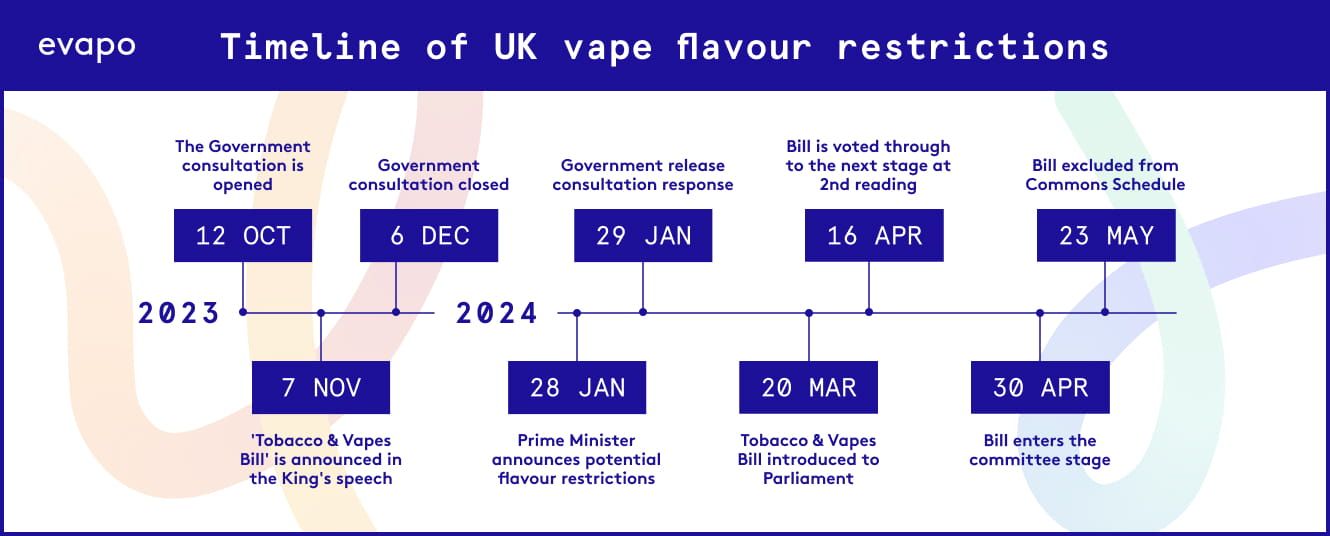
When will vape flavours be banned?
As the Tobacco and Vapes Bill was abandoned following the call for a general election, there are currently no plans for a vape flavour ban in the UK. While the new government do plan to reintroduce the Tobacco and Vapes Bill, it’s progress through Parliament will begin from scratch and there is room for change. This means that there will not be a vape flavour ban introduced on 1 April 2025 as previously proposed by the Tory Government.
There are a number of steps that must be taken before vape flavour restrictions could be brought to pass, including public consultations which offer us an opportunity to help shape future regulations.
In order to implement any regulations on vape flavours the Government would first need to allow themselves new powers to regulate, which requires primary legislation to be put in place. This is because, unless the Government have given themselves the power to regulate something, they cannot implement any regulations.
When it comes to the devolved nations, Wales will be legislated through the UK Parliament, while Scotland will likely use a legislative consent motion to allow the UK Government to legislate on their behalf. Northern Ireland endorsed a legislative consent motion to enable the Tobacco and Vapes Bill just days before the general election was called, indicating they will likely do the same on future legislation.
What does it mean for the UKs vapers?
While we don’t yet know whether the next Government will choose to ban or restrict specific flavours, it is clearly a proposal which we need to take seriously.
Research carried out by Opinium and commissioned by an IBVTA member spotlights a strong belief that excessive vaping regulations and restrictions such as flavour bans could actually prevent adult smokers from choosing to make the switch to an e-cigarette. In fact, 59% of vapers report that vape flavours helped them quit smoking and 39% of those who used an e-cigarette to help them quit smoking used fruit flavours to do it.
While the abandonment of the Tobacco and Vapes Bill is good news for vape flavours, it is important that the vaping industry does not become complacent and continues to bring awareness to the important role vape flavours play and how they can aid smokers in making the switch to vaping.
Evapo reaction to the proposed flavour ban
Evapo founder & CEO and UK Vaping Industry Association (UKVIA) board member, Andrej Kuttruf, recently took part in an interview with GB News about the Tobacco and Vapes Bill. He highlighted fears that the Government hope to bring in many new bans and regulations that they may not be able to enforce, explaining:
“Vaping products are already banned for the underage, yet kids are getting hold of these products. So, what we don’t need now is more bans, more restrictions, if the Government can’t even enforce its existing laws. The black market has been allowed to flourish, so what we really need is to prosecute these criminals and to introduce harsh fines.”
Some of the proposed restrictions within the Bill, like the restriction of vape flavours, could have had the adverse effect of making vaping a less appealing alternative to smoking for adults. Research from the Government’s own impact assessment found that over one in ten current vapers are at risk of relapsing back into smoking if their preferred flavours are no longer available, which is surely something that should be avoided at all costs. Andrej explains:
‘If the Government want to achieve Smokefree 2030 for this country it needs to embrace vaping as part of the solution. The UK has now achieve one of the lowest smoking rates in Europe, thanks to a very pro-vaping stance in the past.”
He expressed the fears that are being voiced by many, that vaping is being bundled in with smoking by creating a combined Bill to address both:
‘It should not really be one shared bill, because vaping is really the solution to smoking. The Office for Health Improvement and Disparities is clear that vaping is at least 95% less harmful than smoking, it’s twice as effective as other ways to quit… The message to smokers should be that the best thing they can do for their health to quit smoking completely or to switch to vaping. I think the Government is confusing the issue.’
As a vaping retailer we see first-hand the important role that vape flavours play in helping adult smokers make the switch to a less harmful alternative. Quitting smoking is not easy, and so having an alternative option that is not only effective and accessible, but also enjoyable, makes all the difference. We fully support efforts to tackle youth vaping, but want to find a solution which also protects those adults who rely on vaping as a way to help them remain smokefree. For this reason we will continue to lobby MPs to ensure that any regulations brought in by the new government are proportionate and subject to the appropriate assessment and consultation.
You can watch Andrej Kuttruf’s full interview in the video below.
'What we don't need now is more bans, more restrictions, if the Government can't even enforce its existing laws.'
— GB News (@GBNEWS) April 16, 2024
Chief Executive of the UK Vaping Industry Association, Andrej Kuttruf, explains what he thinks would be a better alternative to the Government's smoking ban plan. pic.twitter.com/NB9gJGvSaS
Sources
Gov.uk 12/02/2024
Ibvta.org.uk 26/01/2024
Ncbi.nlm.nih.gov 02/08/2019
Urmc.rochester.edu 03/11/2022
gov.uk 07/11/2023
Petition.parliament.uk 14/02/2024
Ncbi.nlm.nih.gov 21/05/2023
bmj.com 09/01/2025
gov.uk 15/04/2024
theguardian.com 04/2024
gov.uk 20/03/2024
medrxiv.org 21/03/2023
gov.uk 29/09/2022
independent.co.uk 23/05/2024
bbc.co.uk 05/06/2024
worldvapersalliance.com 27/06/2024
responsiblevapingappg.org 09/10/2024
gov.uk 05/11/2024
parliament.uk 05/11/2024
petition.parliament.uk 09/04/2025

